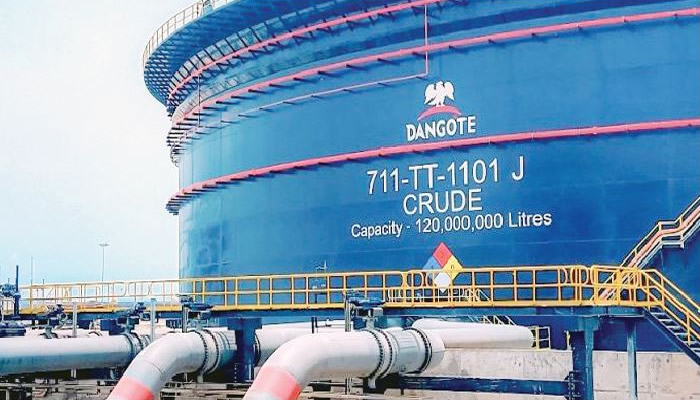The Dangote Petroleum Refinery has reaffirmed its commitment to ensuring a steady supply of refined petroleum products across Nigeria, announcing that its current output has now exceeded the nation’s domestic demand for refined fuels. This declaration comes amid growing optimism that the refinery’s full-scale operations will help end Nigeria’s long-standing dependence on imported petroleum products and stabilise pump prices across the downstream sector.
Speaking in Lagos, the refinery’s management disclosed that with increased refining capacity and expanded operational efficiency, the plant is now capable of producing sufficient petrol, diesel, jet fuel, and kerosene to meet local needs and also create surplus volumes for export to other African markets.

According to the company, the 650,000 barrels per day (bpd) refinery has achieved an output rate that not only meets national consumption levels but positions Nigeria as a potential net exporter of refined petroleum products for the first time in decades. This milestone marks a significant turning point in the country’s energy sector, which has for years grappled with import dependency and price volatility due to limited refining capacity.
An official statement from the refinery noted that the facility’s efficient operations were made possible through continuous optimization, maintenance planning, and collaboration with the Nigerian National Petroleum Company Limited (NNPCL) and regulatory authorities to ensure transparency and compliance with global standards.
The Vice President of Oil and Gas at Dangote Industries Limited, Devakumar Edwin, stated that the company’s mission extends beyond profit-making to supporting Nigeria’s broader economic stability and energy security. “Our primary focus is ensuring Nigerians have access to reliable, high-quality fuel at stable prices,” he said. “The Dangote Refinery was built to change the narrative of fuel scarcity and dependence on foreign imports. We are proud to say that our production capacity now surpasses the country’s daily demand.”
Edwin also highlighted the refinery’s role in conserving Nigeria’s foreign exchange reserves by reducing the nation’s import bill, while boosting local employment, technology transfer, and industrial development.
The refinery’s consistent supply, he added, will help stabilize the downstream sector, support small and large-scale fuel marketers, and minimize the disruptions that have often led to fuel scarcity and long queues at filling stations.
Industry experts have praised the development, noting that Dangote Refinery’s achievement could significantly impact fuel pricing dynamics and macroeconomic stability. An energy analyst, Dr. Bode Omowumi, said the refinery’s increased output could help curb inflationary pressures triggered by high fuel costs. “If the refinery continues at this pace, Nigeria could see a reduction in logistics costs and improved productivity across industries dependent on fuel,” he remarked.
Meanwhile, the Minister of State for Petroleum (Oil), Heineken Lokpobiri, commended the refinery’s management for its operational success and its contribution to Nigeria’s energy independence. He said the Federal Government remains committed to supporting private sector-driven investments that promote self-sufficiency and sustainable development.
The Dangote Refinery’s expansion plans are also expected to push production beyond its current 650,000bpd capacity, with projections indicating the refinery could refine up to 1 million barrels per day once the next phase of development is completed. This expansion aligns with the company’s long-term vision to transform Nigeria into a refining and petrochemical hub for Africa.
In addition to meeting domestic demand, the refinery has begun exploring export opportunities within the West African subregion, targeting markets in Ghana, Togo, Benin, and Côte d’Ivoire. Analysts predict that the move will strengthen Nigeria’s trade balance and cement its influence in regional energy supply chains.
Economic observers also believe the refinery’s success will have ripple effects on related sectors such as shipping, logistics, and manufacturing. The refinery’s petrochemical complex, which produces polypropylene and other industrial chemicals, is already providing raw materials to local manufacturers, thereby reducing import dependency in non-oil industries.
However, challenges remain, particularly in the area of distribution infrastructure and transportation logistics. Some downstream marketers have called for improved coordination between the refinery, regulators, and the Nigerian Midstream and Downstream Petroleum Regulatory Authority (NMDPRA) to ensure seamless delivery of products across the country.
The refinery management acknowledged these logistical challenges but assured stakeholders that measures are being taken to enhance supply chain efficiency, including the use of pipelines, vessels, and rail networks for product distribution.
Dangote Refinery, which began operations earlier this year, represents one of the largest single-train refineries in the world and Africa’s biggest industrial investment. The $19 billion facility was conceived as part of Aliko Dangote’s vision to make Nigeria self-reliant in energy production and create jobs for thousands of Nigerians.
As production stabilizes and efficiency improves, the refinery’s promise of steady fuel supply could mark the end of Nigeria’s decades-long fuel scarcity problems. Industry players see this as a new dawn for the oil and gas sector — one that could redefine Nigeria’s economic landscape and reinforce its position as an energy powerhouse in Africa.
Support InfoStride News' Credible Journalism: Only credible journalism can guarantee a fair, accountable and transparent society, including democracy and government. It involves a lot of efforts and money. We need your support. Click here to Donate
